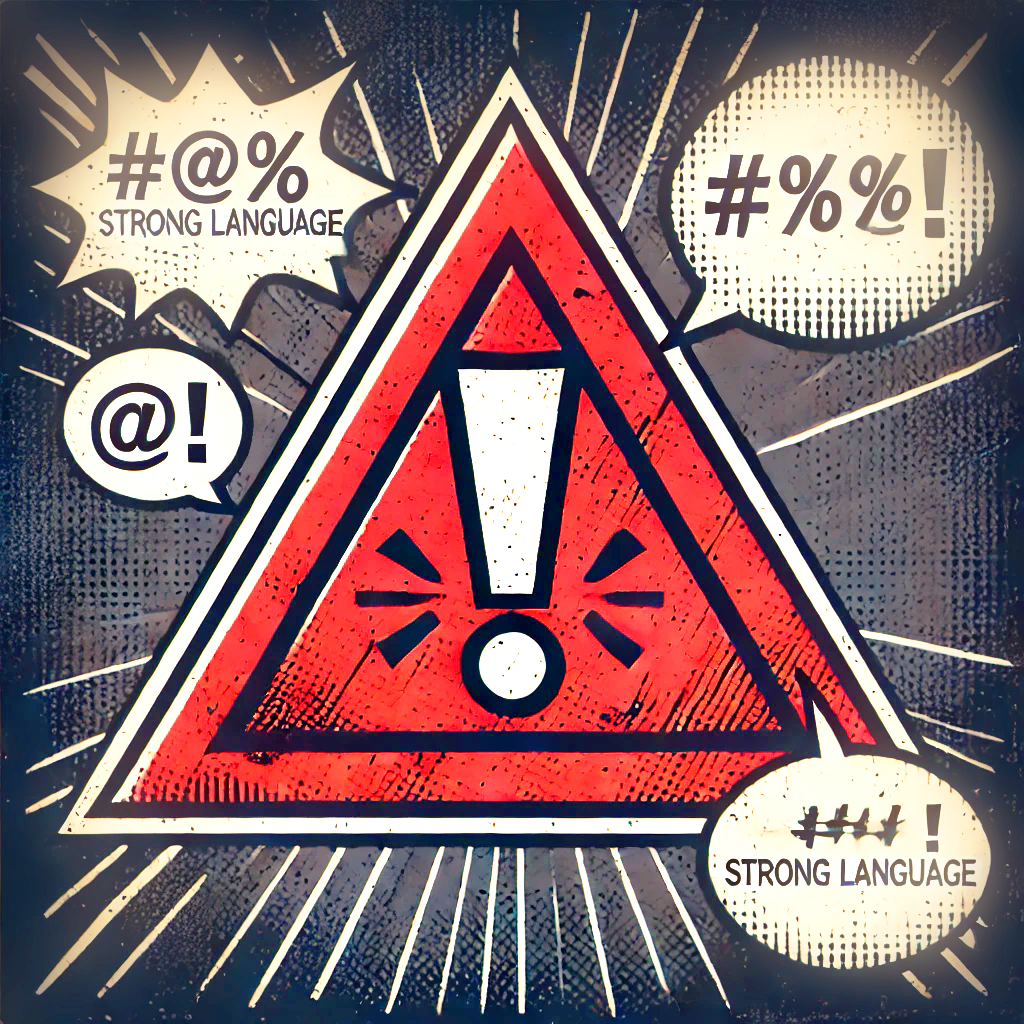Why Satanists Often Find Themselves Engaging in Discussions About Christianity (and Other Faiths with Absolute Law-Givers)
When you’re a Satanist, it’s not because you signed up for some feel-good spiritual retreat where everyone holds hands and sings kumbaya. No, you either get it, or you don’t. And if you get it, you know that moral authority—especially the kind peddled by religions like Christianity—is just a tool for control, not some divine truth. So why do we Satanists keep finding ourselves in discussions about Christianity? It’s not because we’re looking for a Sunday school invitation, and it’s definitely not because we’re secretly yearning for a slice of that holy pie. It’s because when someone starts shoving their centuries-old moral superiority down your throat, you don’t just smile and nod—you push back, hard. And let’s not kid ourselves, Christianity isn’t the only religion on our radar. We’ve got questions for any faith that thinks an absolute law-giver is the ultimate authority on how everyone should live.
The Concept of Moral Authority
Moral authority: the crown jewel of religious control. Christianity has been polishing this gem for centuries, holding it up as the ultimate guide for humanity. It’s the idea that some all-seeing, all-knowing deity—who, conveniently, you can’t question—has the final say on what’s right and what’s wrong. And we’re all supposed to just nod along like obedient children because, well, who are we to argue with God? But let’s be honest—this moral authority isn’t about guiding people to some higher truth; it’s about keeping them on a short leash. It’s the ultimate power play, designed to ensure that nobody strays too far from the herd. For Satanists, this is where we step in, sledgehammers in hand, ready to smash that illusion into a million pieces.
Christianity’s Approach to Morality
Let’s not mince words—Christianity’s approach to morality is like being handed a list of do’s and don’ts from a cosmic hall monitor. It’s a rigid, black-and-white system where everything is either good or evil, with no room for nuance or personal interpretation. You follow the rules, you’re in God’s good graces; you break them, and it’s fire and brimstone for eternity. This isn’t just a guide for living; it’s a control mechanism, designed to keep people quaking in their boots, too scared to think for themselves. But for those of us who prefer a little thing called independent thought, this approach feels more like being locked in a moral straitjacket—tight, suffocating, and completely unnecessary.
Satanist Morality as a Personal Construct
Now, let’s cut to the chase—Satanist morality. We’re not interested in living by someone else’s ancient rulebook, especially one written by people who thought the earth was flat and women were property. In Satanism, morality isn’t some divine hand-me-down; it’s something you build for yourself, based on your own experiences, desires, and understanding of the world. It’s about living authentically, without needing divine approval. If that makes us seem selfish or immoral to the self-righteous crowd, well, that’s just the icing on the cake. We’d rather be labeled as rebels than live under the thumb of a deity who’s as responsive as a brick wall.
And let’s be clear—this isn’t about running amok and doing whatever the hell we want. It’s about making deliberate, informed choices and owning them. We’re not looking for a get-out-of-hell-free card; we’re here to live life on our terms. Because at the end of the day, the only moral authority that matters to us is the one we create for ourselves.
Debates Around Moral Relativism
This is where things get interesting—moral relativism. For Satanists, morality isn’t a one-size-fits-all affair. It’s fluid, situational, and deeply personal. What’s right for one person might not be right for another, and that’s perfectly fine. But try telling that to a Christian moralist, and watch them go into full-on panic mode. They need their absolutes, their divine rulebook, to keep from spinning out into the terrifying world of moral ambiguity. The idea that morality could shift depending on context or individual perspective? That’s enough to send them scrambling for their prayer books.
Engaging with these moral absolutists is like trying to teach a cat to fetch—it’s frustrating, but sometimes you get a good laugh out of it. But it’s also where the real work happens. Every time we challenge their rigid views, we’re chipping away at the foundation of their so-called moral authority. We’re not just disagreeing with them; we’re tearing down the idea that there’s a universal moral code everyone has to follow. And nothing gets a Satanist’s blood pumping like watching the pillars of dogma start to crack.
It’s Not Just Christianity—We Question All Faiths with Absolute Law-Givers
Let’s not pretend Christianity is the only religion in our sights. We’ve got plenty of questions for any faith that claims there’s an absolute law-giver up in the clouds, calling the shots. Whether it’s Islam, Judaism, or any other belief system with a deity who thinks they’ve got the final word on morality, we’re here to ask, “Who put you in charge?” The idea that some higher power has the ultimate say on how we should live our lives? It’s not just absurd—it’s downright hilarious. We don’t buy the notion that morality should be dictated by an invisible figurehead, no matter what holy name it goes by.
Satanists question the legitimacy of any divine law-giver because we see morality as a human construct, not some cosmic edict. We believe ethics should be shaped by reason, personal responsibility, and experience—not by ancient laws carved in stone or chanted in a temple. And if that means going head-to-head with centuries of religious tradition, so be it. We’re not here to make friends with the faithful; we’re here to challenge the very foundation of their beliefs.
The Necessity of Challenging Established Norms
So, why do Satanists keep getting into these debates? Because someone needs to shake things up and keep the sanctimonious on their toes. We’re not here to play along with a set of rules that’s been strangling free thought for ages. We’re here to question, to challenge, to rebel against the notion that there’s only one way to live a moral life, dictated by some invisible, unaccountable authority figure. In a world where religions with absolute law-givers have had their way for far too long, it’s not just necessary—it’s essential—that we keep pushing back. And if that means ruffling feathers, stepping on toes, or being branded as the villains, then we’re obviously doing something right.
But let’s get one thing straight: we really don’t care what you believe—as long as you’re keeping it to yourself. Worship a god, a tree, or your reflection in the mirror, it’s all the same to us. Just don’t expect us to be impressed, and definitely don’t try to legislate your beliefs into secular law. Our beliefs aren’t about converting you, and we sure as hell don’t need your validation. So, while you’re busy worrying about what Satanists believe, remember this: we’re not losing sleep over your beliefs, and you shouldn’t be sweating ours. Live and let live—as long as you’re not trying to shove your moral code down everyone else’s throat. Everything else? Just background noise. And we’re more than happy to cut through the static with a well-placed dose of cynicism and a big, fat dose of reality.
Frequently Asked Questions
If morality is individualistic, does that mean anything goes?
The “anything goes” fallacy—always a favorite among those who can’t wrap their heads around nuanced thinking. Here’s the deal: Just because morality is individualistic doesn’t mean everyone gets a free pass to be a complete sociopath. It means you’re responsible for your own moral framework, and guess what? Most people with a functioning brain don’t need a deity to tell them that harming others is wrong. If your idea of “anything goes” includes violating others’ rights, you’re not exercising moral freedom—you’re just proving why society needs laws to keep people like you in check.
But aren’t the laws of the land based on Biblical law?
The old “laws of the land are based on Biblical law” argument. Let’s clear that up. Sure, some laws might echo commandments like “don’t kill” or “don’t steal,” but guess what? Those are common sense, not exclusive to the Bible. You don’t need divine inspiration to figure out that a functioning society shouldn’t run on murder and theft. Plenty of those “Biblical” laws got tossed out with the bathwater because they’re outdated, irrelevant, or downright oppressive. So, while some basic laws might overlap, the idea that modern legal systems are just extensions of Biblical law is a nice fairy tale—about as believable as the talking snake.
How do Satanists define their own moral code without a universal standard?
Defining our own moral code without a universal standard? It’s called thinking for yourself. We don’t need some cosmic rulebook to tell us what’s right and wrong. Instead, we use this handy little tool called reason—maybe you’ve heard of it. We look at our experiences, consider the consequences of our actions, and make choices that align with our values. It’s about personal responsibility, not blindly following a set of rules handed down by some invisible authority. And guess what? Most of us manage just fine without needing a deity to hold our hand. If you need a universal standard to behave decently, that says more about you than it does about us.
What’s the difference between moral relativism and moral nihilism?
Moral relativism vs. moral nihilism—let’s clear this up before you start confusing the two. Moral relativism is the idea that what’s right or wrong depends on context, culture, or individual perspective. It’s like saying, “Hey, what’s right for me might not be right for you, and that’s okay.” Now, moral nihilism? That’s the belief that there’s no such thing as morality at all—no right, no wrong, just a big, empty void where ethics should be. So, while moral relativism is about understanding that different people might have different values, moral nihilism is about throwing the whole concept of morality out the window. We Satanists? We’re not nihilists. We just don’t buy into the one-size-fits-all morality that religions try to shove down everyone’s throat. We think for ourselves and make our own ethical decisions—relatively speaking.
If morality is individualistic, how can society function without shared ethical standards?
The tired “society will collapse if we all think for ourselves” argument. Here’s the thing: individualistic morality doesn’t mean everyone’s running around like headless chickens, doing whatever they please. It means we each take responsibility for our own actions, using common sense and reason—not blindly following some ancient rulebook. Most people, believe it or not, actually care about the well-being of others and recognize that cooperation and mutual respect are key to a functioning society. You don’t need a universal moral standard handed down from on high to understand that stealing, killing, and lying generally screw things up for everyone. Shared ethical standards can and do emerge from the collective recognition of what works best for living together, not from some divine decree. So, no, society won’t implode just because we’re not all singing from the same moral hymnal.
What role does the concept of harm play in Satanist morality?
The concept of harm? It’s pretty straightforward, really. Satanists aren’t out here thinking it’s a free-for-all to hurt others just because we don’t follow some divine rulebook. Causing harm—especially unnecessary harm—is generally a bad idea, not just for the person on the receiving end, but for yourself too. It’s called consequences. If your actions are screwing up someone else’s life, you’re likely to face some blowback, and not just from the law. We’re all about personal responsibility, which means understanding that your freedom ends where someone else’s begins. So, yeah, harm plays a big role in how we make decisions—just because we think for ourselves doesn’t mean we’re blind to the impact we have on others. If you’re causing harm and thinking it’s all cool, you’re not exercising freedom—you’re just being an asshole.
Why do Satanists challenge religious moral authority if they claim not to care about others’ beliefs?
Why do we challenge religious moral authority? Simple—because someone needs to. It’s not about caring what you believe in your own private little bubble. If you want to worship a deity, a rock, or your favorite sports team, go right ahead. We don’t give a damn—until you start trying to impose those beliefs on everyone else. When religious moral authority starts creeping into laws, politics, and social norms, that’s when we step in and say, “Hold up, not everyone signed up for your holy book’s rules.” We’re not here to convert anyone; we’re here to make sure no one’s beliefs are forced onto others. So yeah, we challenge religious moral authority because it often tries to dictate how everyone should live, not just its followers. And if that rubs people the wrong way, too bad—it’s about time someone spoke up.

Darth Grumps
Grumps is the name most folks recognize him by on TikTok, Discord, and various other corners of the internet. He’s the one writing and talking about how Satanism weaves into the everyday grind, working to clear up the usual misconceptions people have about the religion. Through his own unique lens, he offers insights and a slice of Satanic wisdom that only he can provide.
Disclaimer: Grumps and the Church of Satan? Yeah, he’s a Satanist, but he’s not a card-carrying member, nor does he represent them. Grumps’ grumpiness? It’s more about irony than anything else. Just a heads up, the first Satanic Rule of the Earth says, “Do not give opinions or advice unless you are asked.” But hey, you came here to read this, so technically, you asked for it!



Leave a Reply